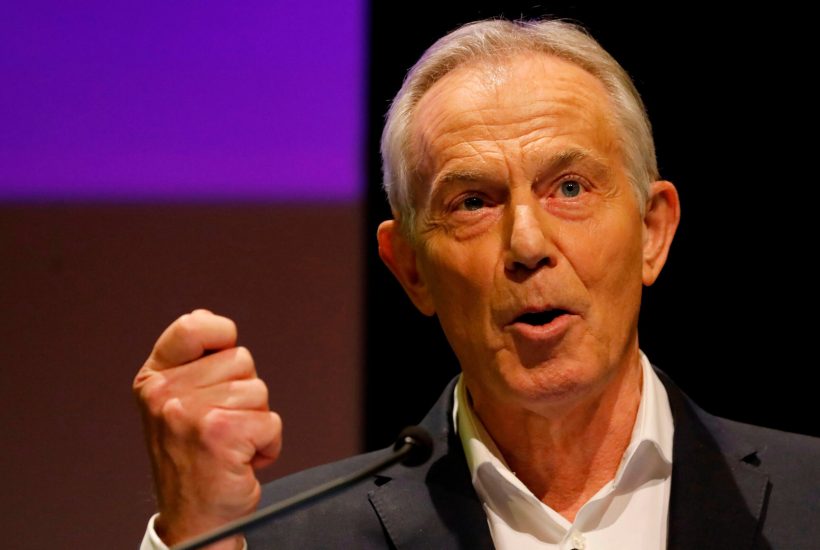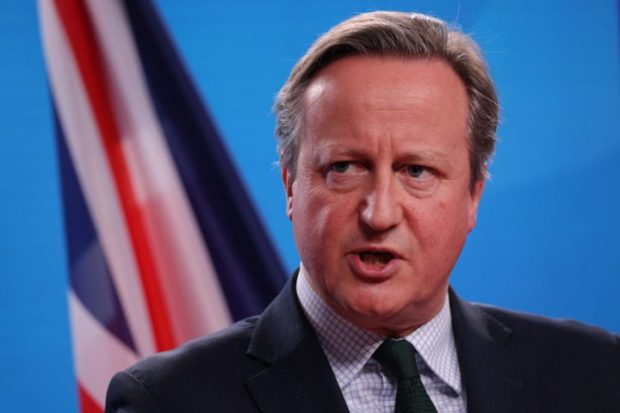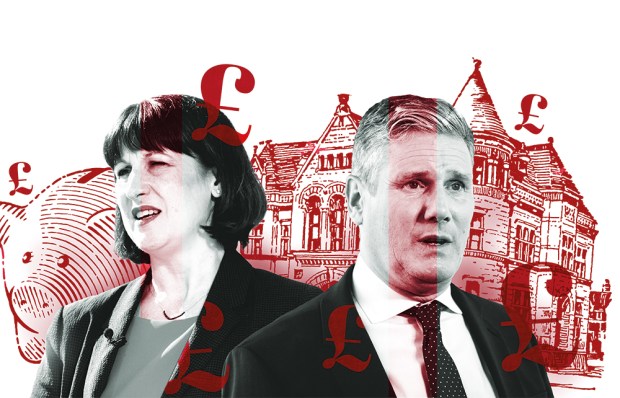If there is more joy in Heaven over one devolutionist who repenteth, the celestial jubilations must be in full roar over a belated admission from Tony Blair. In an interview with ITV News, the former prime minister reflected: ‘I do think one of the weaknesses in the way we approached devolution was not to build real cultural ties and emphasise the enormous things that the different countries in the United Kingdom have in common.’
Although, in familiar self-exculpating fashion, Blair insisted ‘the Union would already be in tatters’ had the Scottish and Welsh parliaments not been established, the semi-penitent constitutional vandal did allow that ‘we were wrong… in believing that devolution would end the argument of independence — it hasn’t ended it’.
No indeed. A new dawn has broken for nationalism in Scotland and, as the Holyrood elections are likely to confirm, things can only get better. Before devolution, the SNP held just six out of 72 Scottish seats, half its electoral high point of 11 in October 1974. At the 2019 election, it took 48 of Scotland’s 59 Westminster seats and has been the largest and governing party at Holyrood for 14 years straight. Independence has gone from 90-minute romanticism to a policy which commands the support of roughly half the Scottish electorate. The dismantling of the UK state, with all the political, economic and national security implications that would come with it, may soon be upon us.
Devocrats consider it unsporting to remind everyone that devolution was supposed to have the opposite effect. Labour’s 1997 manifesto, from which it derived the popular mandate for holding the referendums in Scotland and Wales, pledged: ‘A sovereign Westminster Parliament will devolve power to Scotland and Wales. The Union will be strengthened and the threat of separatism removed.’ Scotland’s Parliament, the white paper published by the Blair government in 1997, specified: ‘Scotland will remain an integral part of the United Kingdom… The UK Parliament is and will remain sovereign.’ Perhaps better known are the words of Scottish Labour grandee George Robertson, who informed everyone that setting up a rival parliament to Westminster would ‘kill nationalism stone dead’. Such reports were greatly exaggerated.
It is not simply that devolution has given separatists a platform: it has provided them the apparatus with which to advance separatism institutionally. Despite the constitution being reserved to the UK Parliament, one of the last orders of business before the Scottish Parliament recessed for the election was the publication of a draft Bill for an independence referendum. The Scottish Government openly pursues an independent foreign policy, with its own mini embassies and international aid budget, and with Nicola Sturgeon touring the capitals of the world during Brexit to undermine the UK Government’s negotiating position. The Scottish Government exists to achieve independence and, when it gets a minute, to run the country.
Westminster has not lifted a finger to stop this behaviour, behaviour that would be unconscionable in other countries, countries with a modicum of self-respect. Instead of standing up for the devolution settlement that Scots voted for, to say nothing of the United Kingdom itself, successive governments have rewarded the SNP’s empire-building. When Alex Salmond unilaterally renamed the Scottish Executive ‘the Scottish Government’, despite the former being its legal title, Westminster conceded the new terminology with a few years and the Cameron government even wrote it into legislation.
When it became clear that Holyrood was functioning as a one-way ratchet towards separation, having extracted from Cameron an independence referendum and one tranche of extra powers, he elected to hand it another, even bigger tranche and legislate the ‘permanence’ of Scottish nationalism’s parliamentary juggernaut. Blair may have been a constitutional vandal but Cameron graffitied every wall he could find with ‘Dave woz here, too’.
Blair’s admission, two decades late and ludicrously qualified though it is, is welcome nonetheless. Devocrats spent a long time insisting their project wasn’t being used to hasten independence. Why, only a crazy person could think that! When the truth could no longer be denied, they changed tack to declare this a perfectly natural development in devolution. Why, only a crazy person could object to that!
Devolution is so insidious because it draws even the doughtiest sceptic into its destructive logic. Many Unionists who should know better are calling the Holyrood vote the most important electoral test Boris Johnson will face on May 6. It is not. The English local elections (especially in the North and the Midlands) and the London mayoral race (in which Count Binface has given a better accounting of himself than the Tory candidate) are much more important indicators of the country’s thinking as the 58th Parliament passes its 500-day mark.
The only significance of the Holyrood election, which nationalists are using a referendum on their right to another referendum, is as a symbol of Westminster’s unpardonable negligence. Separatists have turned the guns of one part of the state onto the state itself and in response ministers are briefing Tim Shipman that now might be a good time to hold a fresh plebiscite. Whitehall’s complacency is outstripped only by its cluelessness and cowardice.
The truth is that neither of the two main parties cares all that much. If Scotland swung back to Labour tomorrow, both Sir Keir Starmer and Boris Johnson would be mightily relieved. They are not interested in repairing the systemic faults that devolution has introduced to the UK constitution, both of them just want the problem to go away. Labour, which disdains Blair for everything but the one thing he might actually deserve disdain for, will not admit that devolution was a historic error. The Tories, who said at the time that it would be, have made not one ounce of effort in the ensuing quarter-century to develop a Conservative theory of devolution, let alone a blueprint for addressing Labour’s mistakes.
My contention is not that devolution be done away with, merely that it be legislatively reformed to secure rather than strain the Union, but even that seems too much to ask for. For some time now, I have been arguing that a new Act of Union is needed to save the UK from separatism. I’m starting to wonder whether the more pressing threat to the UK is from its own government.
Got something to add? Join the discussion and comment below.
Get 10 issues for just $10
Subscribe to The Spectator Australia today for the next 10 magazine issues, plus full online access, for just $10.




















Comments
Don't miss out
Join the conversation with other Spectator Australia readers. Subscribe to leave a comment.
SUBSCRIBEAlready a subscriber? Log in